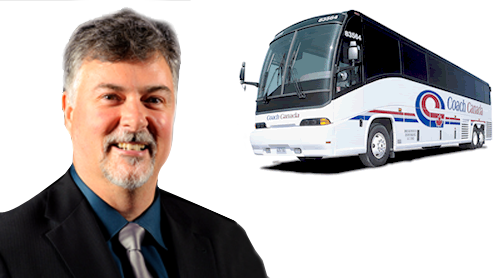
By David Hubbard
This past year industry leaders from both sides of the border wished Brian Crow well in his retirement after 27 years at the helm of Motor Coach Canada (MCC). The search to fill his position has since culminated with the board of directors naming Doug Switzer as its next president and CEO. Switzer arrives on the scene with formidable transportation credentials and with his work in provincial government and for the Minister of Transportation of Ontario. Shortly after his appointment Switzer visited with BUSRide to discuss his new perspective of the industry and early agenda for MCC.
 As you settle in, what changes?
As you settle in, what changes?
What stays the same?
I must start off by giving the full measure of credit for the organization and staff that Brian built over the years. He left everything in great shape with little to change. With that said, one issue in particular struck me as being both a challenge and opportunity for our motorcoach operators perhaps over the next 10 years.
Pitching the value of partnerships with the private sector to deliver intercity transit services is my first big issue. Government agencies are becoming increasingly aware that the direct delivery of government services is not the best way to manage the public purse and derive the most value from tax dollars. Outsourcing of transit operations could prove more cost effective, particularly for large regional operations.
How could outsourcing affect MCC members?
GO Transit in southern Ontario runs a lot of buses in-house with government employees operating those vehicles. This is a perfect opportunity for the private sector and government to work together to deliver that service. We have attended hearings by our Transportation Committee on a new national public transit strategy and have addressed this possible solution.
What was your pitch to the committee?
We said first of all it should be the transit strategy and not the public transit strategy, which implies government-run systems only. Our position is that the private motorcoach industry needs to be included in any new transit plan. We also deliver commuter passengers and travelers between cities, and our equipment and operations are just as integral to moving citizens around as any of the public systems.
What was the response?
I think our message had some resonance with some of the members of the committee. We’ll see how the report comes out, but we think we have a pretty strong argument. Now is the right time to have this discussion with government. They’re struggling with balancing the competing needs to keep taxes down, maintain or increase government services and manage budgets wrecked by the recession. They need to find new ways of delivering services using fewer tax dollars. We’re confident that if the government lets us in, we can conservatively save 21 percent of what it currently spends on public transit.
Does anything on your plate involve relations with the U.S.?
With the U.S. and Canada recently agreeing to a new border accord, we are pressing for motorcoaches to receive a higher priority at border crossings. For years the focus has been on the movement of commercial goods rather than the 600,000 Canadian passengers traveling into the U.S. by motorcoach each year. They represent a significant tourism component, and U.S. Customs should not detain these people for four to five hours. There are technologies available and measures agents can take to speed up this process.
Are you satisfied with your decision to accept the job?
Yes. It is nice to replace a gentleman I consider a friend. I took this on because I do enjoy a challenge. These are weighty issues to deal with and I know there will be plenty to keep me busy in the years to come.
